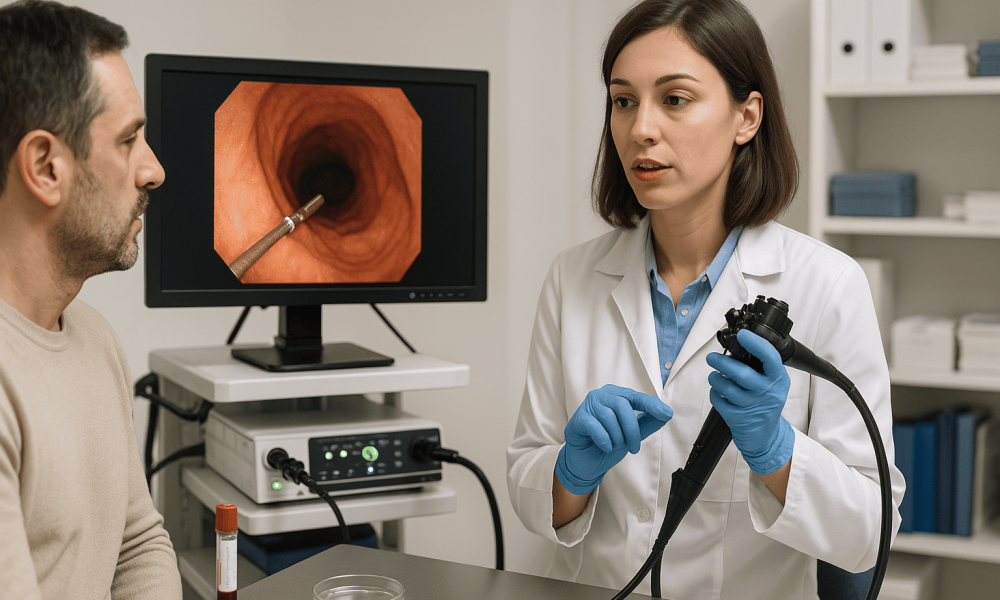Not Feeling Well? These Diagnostic Tests Can Reveal the Truth
When symptoms like digestive discomfort, unexplained fatigue, or nutrient deficiencies persist, it’s time to dig deeper. But how do doctors figure out what’s really going on inside your body? Three powerful diagnostic tools—tissue transglutaminase (tTG) antibody tests, endoscopy, and biopsy—can provide crucial answers.
Whether you’re dealing with suspected celiac disease, inflammatory conditions, or unexplained gut issues, these tests can help identify the root cause. Let’s break them down in simple terms so you know what to expect and why they matter.
For the big-picture foundations of gut, stomach, and liver wellness—plus prevention basics—see our cornerstone guide: Digestive Health: The Essential Guide to Gut, Stomach, and Liver Wellness.
tTG Test: A Blood Test for Celiac Disease
Let’s start with the simplest of the three: the tTG (tissue transglutaminase) antibody test. This is a blood test that screens for celiac disease, an autoimmune condition where your immune system mistakenly attacks your gut lining after consuming gluten.
How does it work? When someone with celiac disease eats gluten (found in wheat, barley, and rye), their body produces specific antibodies. The tTG test detects these antibodies in the blood.
Who needs it? If you’re experiencing symptoms like chronic bloating, diarrhea, fatigue, or nutrient deficiencies, your doctor may order this test to check for celiac disease.
Key facts about the tTG test:
- Highly sensitive—over 90% accurate for celiac disease detection.
- Requires you to be eating gluten for accurate results.
- If positive, further testing (like endoscopy and biopsy) is usually needed to confirm the diagnosis.
But what if your tTG test comes back positive? That’s where the next step—an endoscopy—comes in.
Endoscopy: Taking a Closer Look Inside
Blood tests like tTG are helpful, but they can’t show what’s actually happening inside your digestive tract. That’s where an endoscopy comes in.
What is an endoscopy? It’s a procedure where a doctor inserts a thin, flexible tube with a camera (called an endoscope) down your throat to examine your esophagus, stomach, and small intestine.
Why is it done?
- To check for damage caused by celiac disease (such as flattened villi in the small intestine).
- To look for ulcers, inflammation, or abnormal growths.
- To investigate unexplained digestive symptoms like chronic pain, acid reflux, or trouble swallowing.
Does it hurt? Not really! You’ll likely be given a sedative, so you won’t feel much—maybe just a slight sore throat afterward.
But an endoscopy doesn’t just stop at taking a look. Often, doctors will take a tiny tissue sample for further analysis. That’s where biopsies come in.
Biopsy: Getting Definitive Answers
During an endoscopy, a doctor may collect a small sample of tissue from the small intestine. This process is called a biopsy. The goal? To analyze the tissue under a microscope to check for signs of damage, disease, or inflammation.
Why is a biopsy important?
- It provides the most definitive diagnosis for celiac disease by checking for damage to the villi (tiny finger-like structures in the small intestine that help absorb nutrients).
- It helps identify other conditions, such as Crohn’s disease, infections, or even early signs of cancer.
- It can confirm or rule out suspected conditions when symptoms are unclear.
What happens during a biopsy? Your doctor will use a special tool to collect tiny tissue samples—usually painlessly—during the endoscopy. The samples are then sent to a lab for examination.
When Should You Get These Tests?
If you’re dealing with persistent digestive symptoms, unexplained nutrient deficiencies, or concerns about celiac disease, these tests may be necessary. Talk to your doctor if you have:
- Chronic diarrhea, bloating, or stomach pain.
- Unexplained weight loss or anemia.
- A family history of celiac disease or inflammatory gut conditions.
- Ongoing acid reflux or trouble swallowing.
To understand gluten sensitivity within the broader digestive-health framework, start here: the Digestive Health cornerstone guide.
Final Thoughts: Testing Gives You Power
Ignoring persistent symptoms won’t make them disappear. Tests like tTG, endoscopy, and biopsy take the guesswork out of what’s happening inside your body. They provide clarity, allowing for the right treatment plan to restore your health.
So if your gut is sending distress signals, listen. These tests can help you take control and get the answers you deserve.
